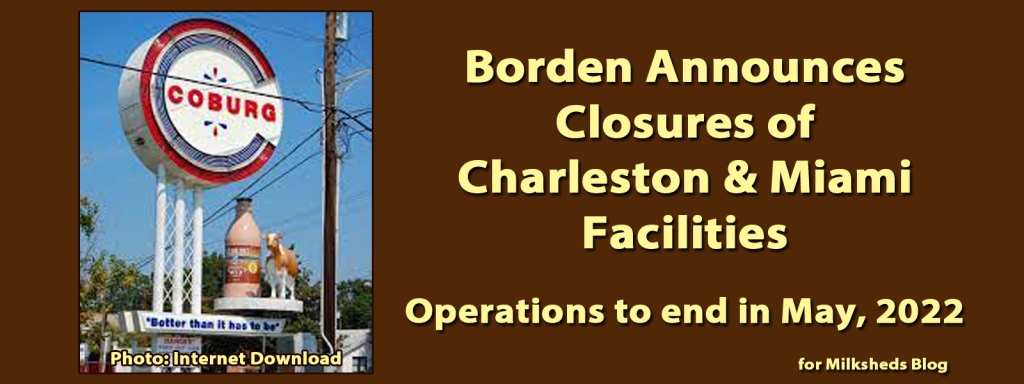
Brings total to 6 Borden plants closed, and 3 sold or leased in 5 months
On Wednesday, August 3rd, Borden Dairy, Inc announced that its Dothan, AL and Hattiesburg, MS milk processing plants would cease operations by September 30, 2022.
This makes a total of 6 processing facilities shuttered by Borden since May of 2022, when Borden closed its Charleston, SC, and Miami, FL plants.
In July of 2022, Borden sold or leased its 3 Texas processing plants to Hiland Dairy.
Additionally, Borden closed a milk processing facility in Chemung, Illinois (owned jointly by New Dairy Opco, LLC and Select Milk Producers, Inc., as a joint venture called NDSM Holdings), and a milk plant in DePere, WI in early July, 2022. Sour cream production reportedly continues in DePere.
The sum of this activity is that 9 plants of 14 listed on the Borden website in a ‘fact sheet‘ will have been closed or leased in 5 months! There is no official word on the plans for the remaining 5 plants as of 10 August, 2022, nor of any licensing deals for the iconic Elsie brand.
As further background, New Dairy Opco, LLC, is the entity formed between KKR and Capitol Peak Partners, two private equity firms, to purchase Borden out of the company’s 2020 bankruptcy process.
While there is no specific information yet available, according to industry sources, somewhere between 25-30 dairy farm producers in Georgia will be affected, several in Tennessee, and an unknown number of farms in Alabama and Mississippi.
Borden products have a distribution area which covers a wide swath of the lower southeast, including the Gulf’s coastal tourist areas. The Dutch Chocolate is a favorite of milk connoisseurs, and their recent introductions of flavored milks have received great reviews.
It will take some time to sort out all of the farm related ripple effects – beginning with independent producers as well as co-op members shipping to those plants, and extended to the milk haulers delivering to those plants. Eventually, in this regional ag economy, agribusiness and suppliers will be affected as well. To what degree is unknown, until producers find new cost-feasible markets for their milk. Transportation costs in particular will be a factor in market change decisions for producers.
Beginning with the Charleston closure, and continuing through the Illinois and Wisconsin closures, there has been quite an effect on school milk contracts which had to be reorganized.
What will be the fate of Elsie, Borden’s iconic cow? That’s really hard to know at the moment, but six plants closed in 5 months time is a huge point of concern.
The southeast is quickly becoming a ‘milk desert,’ which is defined as a region of significant population with limited access to nearby farms which produce nutrient dense foods, and in this case, that’s milk.
With all of the supply chain disruptions and milk transport issues we’ve seen over the past three years, how are southeast consumers going to be served in the future with the goodness of milk’s essential nutrients? This is a big picture question which needs to be considered in the name of food security for an area with 25% of the nation’s population.

























